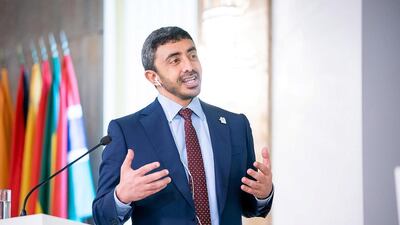In the wake of last Thursday's attacks in the Gulf of Oman, which targeted a Japanese and a Norwegian tanker, Saudi Arabia has joined the United States in calling out Iran. Referring to the unclaimed sabotage of four vessels off the coast of Fujairah last month, Crown Prince Mohammed bin Salman told the Asharq Al Awsat newspaper "the Iranian regime and its proxies have carried out the sabotage operations", which caused damage to two Saudi tankers. The investigations into this incident and the recent attacks are still ongoing, and their source is yet to be confirmed. What is certain at this point is that the Kingdom has borne the brunt of heightening regional tensions. In addition to the unclaimed sabotage of the two Saudi ships, Iran-backed Houthi rebels attacked Saudi oil infrastructure last month and targeted the southern Saudi airport of Abha last Wednesday.
Meanwhile, Sheikh Abdullah bin Zayed, Minister of Foreign Affairs and International Co-operation, has called for the region to come together to find a solution to this ongoing crisis. Since the beginning, the UAE has called for de-escalation. Speaking during a visit to Bulgaria, Sheikh Abdullah even opened a door to diplomatic talks, stating that he remained hopeful of "attaining a broader framework for co-operation" with Iran. The UAE has long championed a multilateral approach to regional problems, and Sheikh Abdullah's statement attests to the nation's firm belief that diplomacy must always come first. In the long run, a political solution is the only way to resolve the current situation and to achieve peace in Yemen, where Iran has backed the Houthi rebels in a four-year war against the country's internationally recognised government.
The idea of sitting down at the table with Iran may seem optimistic, given recent events. Not only is the atmosphere in the Gulf region strained, Tehran has refused US President Donald Trump's invitation to renegotiate the terms of the flawed nuclear deal – an agreement Mr Trump unilaterally withdrew from in May last year. Washington was right to opt out of the deal, as it did not involve the countries most deeply affected by Iran's destabilising influence. It also permitted Tehran to export oil and receive foreign investments, in exchange for restricting its nuclear programme. Instead of curbing its reach in the region, the agreement allowed Iran to maintain its support of groups such as the Houthis in Yemen and Hezbollah in Lebanon. By tightening sanctions against Tehran, the US has starved the regime and its proxies of vital funds. However, if we are to find a viable solution to this problem, regional players must be involved. Sheikh Abdullah has given the world new hope that it may not be too late for a diplomatic resolution.

